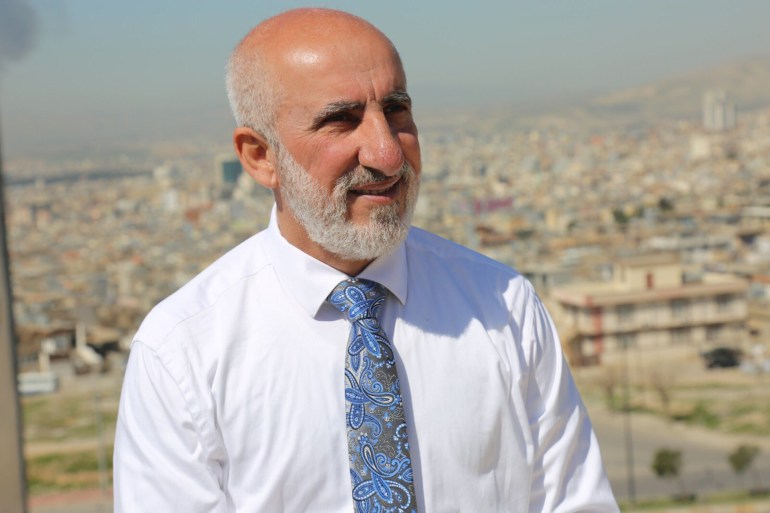The Iraqi economy is under great pressure due to the drop in oil prices, high public sector expenditures and the outbreak of the Corona virus in the country, which made the government unable to pay employees' salaries on time.
The Iraqi state pays the salaries of nearly 7 million people, represented by the salaries of employees, retirees, political prisoners, martyrs and social care, whose annual salaries amount to $ 62 billion, while Iraq's oil revenues from the beginning of the year until last September amounted to $ 30.2 billion, and the financial budget is approved. On oil revenues by 93%.
The Iraqi government resorted to a policy of internal borrowing to fill the deficit in the financial budget and pay the salaries of state employees, as internal borrowing increased from about 32 billion to 43.5 billion dollars until last August, and most of the borrowing relied on the central bank and government banks, and the government seeks to borrow 34 billion Dollars over the next two months to cover the deficit in the coming months.
Mulla Talal warned that if parliament does not approve the law to cover the financial deficit, salaries cannot be paid (communication sites)
In turn, the Central Bank informed the Iraqi government of its inability to finance the budget, as reserves of foreign currency fell to 54 billion dollars after it was about 65 billion dollars at the beginning of the year, as well as deposits of government banks reached the minimum permissible level, and became unable to buy Government bonds.
Last Thursday, government spokesman Ahmed Mulla Talal warned that if the parliament did not approve the law to cover the fiscal deficit, the salaries of employees could not be paid, indicating that there is no liquidity in the government except by borrowing and covering the fiscal deficit, and it has gone in this direction obliged, and it is You cannot secure salaries unless this law is passed.
Ahmed Al-Hajj believes that the state is bankrupt and needs real reforms (Al-Jazeera Net)
The government is bankrupt
For his part, a member of the Parliamentary Finance Committee, Ahmed Al-Hajj, told Al-Jazeera Net that the government's talk about not paying salaries until after the parliament approved the second borrowing bill indicates that it is bankrupt and is unable to grant employees their salaries, indicating that the government needs to work on reforms Real and stop borrowing.
He added that the Iraqi economy is going through a very difficult circumstance, and needs great efforts to save it from the current situation, explaining that the state needs to pay attention to the private sector by legislating laws that serve it.
The Minister of Finance, Ali Abdul-Amir Allawi, acknowledged the seriousness of the economic situation, and that failure to reform it would lead to collapse, indicating that the implementation of the White Paper would help the economy and lead to improving the lives of citizens.
The White Paper is an economic document that the government presented earlier this month and included new mechanisms for economic reform, and it includes hundreds of measures aimed at improving the economy and exploiting the country's resources in ways described as feasible, and the paper is about 100 pages, provided that its implementation is between 3 and 5 years.
Zaitoun Al-Dulaimi considered that there is a great deal of confusion in the decisions of the Ministry of Finance, which is trying to make Parliament confront the employees (Al-Jazeera)
Confusion with decisions
, a member of the Parliamentary Economic Committee, Zaitoun Al-Dulaimi, told Al-Jazeera Net that Iraq needs to direct the budget properly, as there are several ministries that have companies and investments, and are taking their share of the budget, indicating that there is great confusion in the decisions of the Ministry of Finance, and therefore the ministry is trying to make Parliament in Facing employees not to pass the second borrowing bill.
She indicated that Iraq needs to reform the public sector, and move towards the private sector gradually, because the survival of the situation may lead to the collapse of the economy.
Saleh stressed that Iraq needs an international financial alliance (Al-Jazeera Net)
Resorting abroad
and the Iraqi government resorted to international institutions - specifically the seven industrialized countries (America, Britain, Germany, Italy, Japan, Canada and France), in addition to the IMF and the World Bank - to obtain advice to manage the financial crisis, diversify the economy and restructure companies, so the Economic Contact Group for Iraq was established, which Britain shall bear the costs of its establishment.
The financial advisor to the Prime Minister, Mazhar Muhammad Salih, told Al-Jazeera Net that, due to the Corona pandemic, the crisis of its oil resources, and its harmful repercussions on the national economy, Iraq is in dire need of an international financial and economic alliance from the great countries, similar to the statement of the Tokyo Summit of the Seven Big Seven in May 2016 that supported Iraq Economically, in the face of its economic crisis and the fight against ISIS.
He pointed out that the government is determined to achieve reform through the White Paper, and thus this will positively affect the economy after it is implemented through diversifying its sources.
But Saleh - who is a professor of economics at Baghdad College - said in his interview with Al-Jazeera Net that the indicators of the economy are very good, but the government is on the verge of financial failure, explaining that Iraq has financial resources to meet the expenses, but the government is unable to collect and control them, for example, Iraq's revenues from selling fuel in Inbound may reach more than 20 billion dollars annually.
He pointed out that the government possesses revenues from customs, higher education, education, justice, real estate tax, transportation, and others, but these revenues are shared between the influential parties, adding that solving the problem of the economy needs national will and not words.

